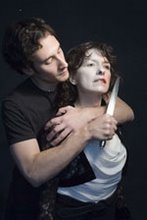- Hamlet was immediately popular, judging from the many contemporary references.
- Of the 18th century productions, most notable was the first female Hamlet, Sarah Siddons. The role was regarded as having many feminine qualities and was later played by Sarah Sarah Bernhardt, Eva La Gallienne and others, including, in 2000 by German actress Angela Winkler at the Edinburgh Royal Lyceum.
- Edmund Kean from 1814-1833 was the first to react to the Ghost “with affection and eagerness rather than terror and the first to treat Ophelia with love rather than brutality.”
- 1864-1885 saw the period of Henry Irving, who moved Hamlet to “genuine lunacy, reflecting the interest in madness typical of the period,” and of Fanny Morant and Margaret Leighton who introduced “a more sexual, voluptuous… Gertrude.”
- With John Barrymore came the psycho-analytical, Freudian approach and a “strong sexual undercurrent between Hamlet and Gertrude" AND between Ophelia and Laertes (hadn’t heard that one before).
- This was followed by Olivier’s Oedipal reading and Gielgud’s romantic, disillusioned and frustrated “sweet prince.”
- The 1960s & 70s saw an explosion of controversial Hamlets reflecting the political upheaval at the time, for example Peter Hall’s “student prince” “anti-hero” “existential prince”– “the modern intellectual tortured by the needs of political commitment.”
- Then in 1975 came Buzz Goodbody, “the first (and so far last) woman to direct a major British production.” Her modern-dress, studio production “attempted to break down barriers between audience and actors [by having] soliloquies delivered directly to” the audience.
- In the late 70s, Jonathan Pryce’s Hamlet was physically possessed by his father’s ghost.
- 1989’s Daniel Day-Lewis had to withdraw from the production because he became convinced that he saw his own father’s ghost, not Hamlet’s.
- In a 1999 poll, the play was voted the ‘master-work’ of the millennium.
Sunday, April 22, 2007
RSC Site
Another very informative and comprehensive (and fun) website is the Royal Shakespeare Company's, specifically Hamlet's production history through the ages.It encapsulates the definitive, mostly British approaches to Hamlet over the centuries, beginning with the first productions after its completion around 1600/1 and ending in 2001. Some things that stood out for me:
Subscribe to:
Post Comments (Atom)



2 comments:
wow! the play was immediately popular!? i was always under the impression that the play was not immediately popular - that it took a while to enter the companies' rotation...
Well, this is according to RSC (but ya can't believe everything you read, so who knows): "Written about 1600/1, when Shakespeare was at the height of his powers, Hamlet was immediately popular, as is clear from the numerous contemporary references, quotations and parodies. The title page of the First Quarto, printed in 1603, describes it as having been 'diverse times acted by his Highness servants in the City of London: as also in the two Universities of Cambridge and Oxford, and elsewhere' - a more widespread claim than that made for any other of Shakespeare's plays. Though we have no records of performances at the Globe, Hamlet was certainly played at court in 1619 before James I and in 1637 before Charles I."
Post a Comment